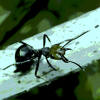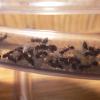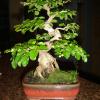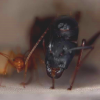Hello Everyone;
Here are a few suggestions I can make that aren't quite as cool as lasers, but they'll help reduce or eliminate the amount of water molecules that attach to the glass or acrylic of your formicaria, causing fogging or condensation. Bear in mind that none of these solutions will last forever on the glass or acrylic and may need to be reapplied when they are no longer effective.
1. Anti-fog solution for eyeglasses - When my wife worked for an optometrist, she bought me a spray bottle of solution that was made to reduce fogging of eyeglasses when you go from the freezing cold outdoors into a warm, humid house. You simply spray it on, wipe until dry and you're done. Although this product works well to repel water and reduce fogging, I don't think it'll last as long as some other solutions.
2. Heavy mineral oil - I use heavy mineral oil, wiped very thinly on the walls of a formicarium as a deterrent to keep ants from climbing the walls. One of the side benefits of the oil is that water molecules don't stick well to it, so no condensation.
3. Wood preservation treatment - A woodworking friend of mine makes a mixture of hot olive oil and beeswax that he uses as a treatment for cutting boards and other projects. It's the consistency of a paste when cool that's rubbed into the wood: I think if it was applied thinly to glass or acrylic it would repel water molecules which don't stick well to wax or oil, wax won't run so it might last longer than oil alone.
4. Shoe polish - I'm going to tell you a secret that many of my woodworking friends would give their eye teeth to know. No one can figure out how I get a beautiful warm shine on my woodworking projects without it being too shiny and garish. I use shoe polish, natural or clear if I don't want any colour, or coloured to fill small imperfections if I'm restoring old furniture and the like. I think clear shoe polish, which is basically made of wax, wiped on glass or acrylic and polished when dry, would repel water molecules like any other wax and last about as long as it does on your shoes.
Lastly, I don't use formicaria that have a glass panel on the front held on by magnets, but I do have an idea that might allow you to easily replace the glass. I know that magnets are very hard to pull apart, but very easy to slide apart. If you had a second piece of glass treated with one of the methods above, could you not slide it into place while pushing the original piece of glass out of the way. Then you could replace it with minimal ant escapes. Perhaps the magnets aren't placed in a way that this would be possible, I don't know, it's just an idea. I'd also do it first thing in the morning when ants are usually less active, and I'd have my pooter handy in case of the odd escape. Cooling the ants in the refrigerator beforehand will also slow them down, making the entire process a little easier.
All these methods to reduce fogging and condensation depend on the water repellent properties of wax and/or oil. Neither of these materials will last forever on glass or acrylic and may need to be reapplied when they become ineffective. The reappearance of fogging and condensation will be your clues that the repellent needs to be reapplied. Good Luck
RPT
My father always said I had ants in my pants.



















